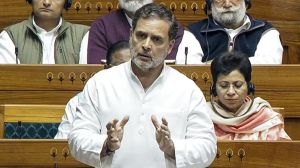Explained: As Boris Johnson teeters on the brink, the many crises of his rocky Prime Ministership
The Pincher scandal that finally led to the resignations of Rishi Sunak and Sajid Javid is only the latest in a long line of scandals and crises of the PM's 3 years in power. Partygate, in which he is personally implicated, is top of the list
 Prime Minister Boris Johnson speaks in the House of Commons in London on July 6, 2022. Johnson is fighting for his political future, with a string of resignations of his ministerial colleagues. (AP/PTI)
Prime Minister Boris Johnson speaks in the House of Commons in London on July 6, 2022. Johnson is fighting for his political future, with a string of resignations of his ministerial colleagues. (AP/PTI)
Boris Johnson’s premiership appeared to be on its last legs on Wednesday (July 6), with a string of new ministerial resignations following those of Rishi Sunak and Sajid Javid, two of the United Kingdom’s seniormost ministers, on Tuesday.
Prime Minister Johnson’s nearly 3 years in power, which began with a landslide victory in December 2019, has been rocked by a series of scandals and growing criticism from within his own party.
Johnson on Wednesday promised to stay on in power despite “difficult circumstances”, in accordance with the “colossal mandate” given to him by voters, the BBC reported.
A YouGov snap poll showed that 54% of Conservative voters want to see the PM gone, reportedly the first time in the polls that the majority of Tory voters have wanted Johnson to resign.
Here’s a look at some of the major crises that have rocked Johnson’s government so far.
Charges of corruption
Conservative legislators, who were supported by Johnson, voted in November 2021 to stop the suspension of Owen Paterson, a former Tory minister, who was found guilty of breaking lobbying rules. They also set up a committee to review the case and change the parliamentary process of investigating legislators, Reuters reported.
Facing an enormous backlash from legislators of all parties including his own, Johnson was forced to reverse the measures, and Paterson subsequently resigned.
Partygate scandal
From late November 2021 onward, reports began to appear in British media about government officials attending more than a dozen boozy parties in the PM’s No. 10 Downing Street residence-cum-office, and in other government offices when the country was under a harsh lockdown due to the coronavirus pandemic.
Johnson repeatedly denied the allegations, and said no lockdown rules had been broken by him or his colleagues.
On May 25, the senior civil servant Sue Gray published a highly anticipated report, which revealed details and photographs of 16 parties between May 2020 and April 2021 at Downing Street. Johnson was reportedly present in at least six of the alcohol-laden illegal parties which were “not in line with Covid guidance at the time”.
Strict restrictions were in place in the UK at the time the parties were held, and people were banned from meeting more than one person outdoors, access and physical contact at funerals were restricted, and people had been stopped from meeting dying family members in hospitals.
A day after the report was published, Johnson apologised to the public and told the House of Commons that he took “full responsibility”. On June 29, Parliament called for a probe into whether Johnson had earlier misled lawmakers over the lockdown parties.
Reduced support in party
Johnson was able to secure enough votes to survive the no-confidence motion that was brought against him on June 6 by a large faction of the Conservative party.
While 211 of the 359 Tory MPs backed him, 41% (148 MPs) voted against him, diminishing Johnson’s legitimacy.
While under the rules he cannot face another no-confidence motion for another 12 months, due to the sheer size of the rebel Tory faction, there is a real possibility that they might push for the rule to be changed and hold another vote sooner.
Johnson was able to retain his position, but for many of his supporters the result was worse than expected. This was in light of the fact that he was able to win the Conservative Party in 2019 its largest vote share since 1987.
Resignation, election setbacks
On June 24, Oliver Dowden resigned from the position of co-chairman after the Conservative Party suffered a devastating loss in the by-elections for two parliamentary districts, Wakefield and Tiverton and Honiton.
The loss of Tiverton and Honiton to the Liberal Democrats was immensely significant as they overturned the Conservative Party’s 24,000 majority in the district, the biggest ever majority to be overturned in a by-election, according to The Guardian.
Stating that these were the “latest in a run of very poor results for our party”, Dowden said, “We cannot carry on with business as usual” and that “somebody must take responsibility”.
The by-elections were held after the two Tory lawmakers who held the seats resigned after facing sex scandals. Imran Khan quit in February, after being convicted of sexually assaulting a teenage boy, and Neil Parish left his post at Tiverton and Honiton after watching pornography in Parliament.
‘A summer of discontent’
Last month, Britain faced its biggest rail strike in 30 years, when over 40,000 rail workers of the National Union of Rail, Maritime, and Transport workers (RMT) took part in a mass action. They were protesting against frozen salaries, changing working conditions and proposed job cuts, and demanded a raise of at least 7%, to meet the rising costs of living.
With skyrocketing inflation and rising cost of inflation, the strike action was seen as potentially marking the beginning of a ‘summer of discontent’ in the UK as unions representing teachers, airport staff, health workers, civil servants and waste disposal workers, all threatened to strike unless they are given pay increases.
Since then, UK criminal trial lawyers have begun 14 planned strikes on June 27, in protest against low wages and cuts in the government’s legal aid budget, it has been reported.
On July 4, convoys of protesters blocked major roads, demanding government cuts to rising fuel prices.
Newsletter | Click to get the day’s best explainers in your inbox
The Christopher Pincher scandal
Johnson faced perhaps the biggest challenge to his leadership on July 5, after two of his senior most ministers, Treasury chief Rishi Sunak and Health Secretary Sajid Javid resigned from their positions, expressing a lack of confidence in Johnson’s leadership.
The Prime Minister has yet again been under the scanner for his shifting claims on Christopher Pincher, who resigned as Conservative deputy chief whip on June 30, after being accused of groping two men in a London club.
The ministers resigned only minutes after Johnson apologised on television for appointing Pincher and said he had forgotten about being told of the allegations, the AP reported.
Johnson has been accused of not acting against Pincher even though he knew of the sexual misconduct allegations against him in 2019. While on July 1, the government claimed that he was not aware of the charges, on Monday a spokesperson said the PM knew of allegations that were “either resolved or did not progress to a formal complaint.”
After Simon Mcdonald, the senior most civil servant at the UK Foreign Office between 2015-2020, said that the PM was briefed about Pincher, Johnson quickly changed his claim and said he did not immediately recall the briefings in 2019.
- 01
- 02
- 03
- 04
- 05






































